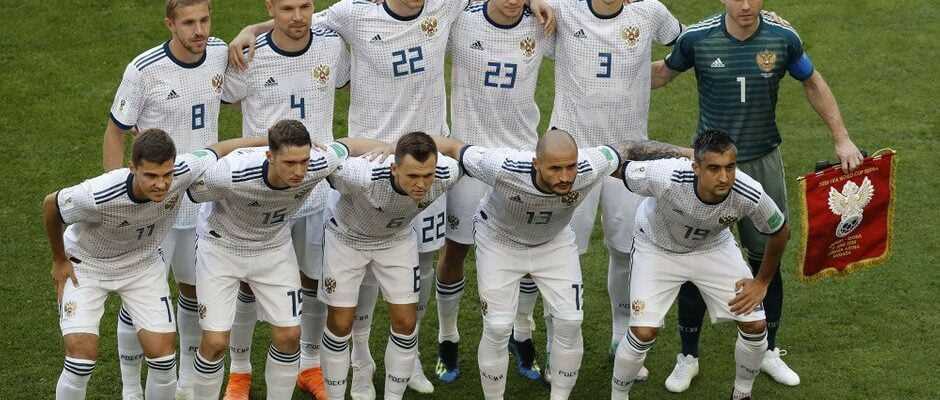Russia was excluded from the World Cup on Monday after the International Olympic Committee recommended banning Russians and Belarusians from world sport.
The International Olympic Committee recommends a historic banishment of Russians and Belarusians from world sport, Fifa immediately gives it satisfaction: Russia was excluded on Monday from the World Cup, a planetary competition it had hosted four years ago. The various selections such as the Russian clubs are deprived “until further notice” of any international competition, a joint decision by Fifa and UEFA, the latter also confirming the termination of its sponsorship contract with the gas giant Gazprom , estimated at 40 million euros per year. For the national team, this means that there will be no play-off on March 24 against Poland, which had declared its determination to boycott the match anyway.
The Euroleague has also suspended the three Russian clubs that take part in European basketball’s flagship competition, but the sanctions announced by Fifa and UEFA are the most spectacular realization of the IOC’s recommendation, which breaks with its long tradition of neutrality in the political and geopolitical spheres: an outright banishment of Russians and Belarusians from world sport as the price of invading Ukraine. If the mighty Fifa were to be emulated by other international federations, Russia would join Slobodan Milosevic’s Yugoslavia and apartheid South Africa in the history of the great pariahs of international sport.
Pressure on the WTA, and decoration withdrawn from Putin
The other federations will be put under pressure, such as that of volleyball, which did not speak, but was warned by France and Poland, respectively Olympic and world champions, that they would boycott the World Cup. next summer if it remained organized in Russia. Similarly, several Ukrainian tennis players have called on the WTA to react, surprised at its silence when it was quick to come to the aid of the Chinese Peng Shuai. To justify its recommendation, which comes a few days before the start of the Paralympic Games in Beijing (March 4-13), the IOC highlights a “dilemma”: “While athletes from Russia and Belarus could continue to participate in sporting events, many Ukrainian athletes are prevented from doing so due to the attack on their country.” To solve it, it “recommends to the International Sports Federations and the organizers of sports events not to invite or allow the participation of Russian and Belarusian athletes and official representatives in international competitions”.
Another measure, symbolic but strong, the IOC has also withdrawn the “Olympic Order” – an honorary distinction awarded to personalities “who have illustrated the Olympic ideal” – from all senior Russian officials, starting with President Vladimir Putin, who has worked for two decades to make sport a tool for domestic and international promotion. Stanislav Pozdnyakov, president of the Russian Olympic Committee, said in a statement that the IOC’s decision went “against the regulations and the charter, in the first place the spirit of the Olympic movement which aims to unite and not to divide. , especially when it comes to athletes or the equality of participants in the Olympic movement”. The question is particularly pressing for the Paralympic Games, which begin Friday in Beijing.
Spectacular break with tradition
“When, in very extreme circumstances”, putting in place these measures “is not possible in the short term for organizational or legal reasons”, the “IOC leaves it to the organization concerned to find its own way”. He therefore refers the decision to the International Paralympic Committee, reiterating his “full support”. He is scheduled to speak on Wednesday. Another spectacular aspect of the IOC’s communication on Monday was its break with its tradition of requiring athletes to be neutral. The IOC thus hailed “the numerous calls for peace made by athletes, sports officials and members of the world Olympic community”. He “admires and supports in particular the calls for peace by Russian athletes”, he continued. Russian tennis player Andrey Rublev, like his compatriots Alex Ovechkin (ice hockey) or Pavel Sivakov (cycling), have clearly expressed their opposition to the war waged by their country. They are now threatened with having to pay a high professional price if their federations follow the recommendations of the IOC. For international footballer Fedor Smolov, this is already the case.
Without waiting for the IOC, several countries had already expressed their refusal to accept the presence of Russians on their territory to compete there. The Champions League final was withdrawn in St Petersburg by UEFA and F1’s scheduled Russian Grand Prix in Sochi was cancelled, seven months ahead of schedule. Two very strong measures affecting symbolic events of Russian sports “soft power”. Asked by AFP even before the new statement from the IOC, Pim Vershuuren, researcher in sports geopolitics at the University of Rennes, already believed that the “decisions taken this week were historic, commensurate with the shock”. And to warn: those to come, and which therefore fell on Monday, “will make precedents and history”.
Any reproduction prohibited
